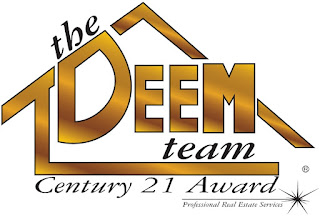Making Your Home More Energy Efficient
David Deem
714-997-3486
Whether you're looking to prepare your home to be sold or just looking to lessen your carbon footprint, the National Association of Home Builders (NAHB) offers the following suggestions for making your home more energy efficient:
- ENERGY STAR appliances. When buying or replacing appliances, choose energy-efficient models. Federal ENERGY STAR-rated appliances are designed to use 10%-50% less energy and water than standard appliances and save an average of 30% over standard models. The up front cost is usually higher, but the payback over time should be well worth it. Look for dishwashers, induction cooktops, refrigerators, and front-loading clothes washers.
- Induction Cooktops. Rather than heating the cooking surfaces, the magnetic induction process turns the pot into the heating element. Food is heated more quickly and to precise temperatures. Cooking with magnetic induction is 90 percent efficient, as compared to resistance electric at approximately 65-percent efficiency, and open-flamed gas which measures in the 55-percent efficiency range. A magnetic induction cooktop costs three to four times more than an electric cook top. A magnetic induction cooktop with four elements ranges in price from $1800 to $4000, depending upon the manufacturer and features.
- High-Efficiency Refrigerators. Because a refrigerator is one of the most energy-consuming household appliances, federal regulations have mandated energy ratings and efficiency improvements for all refrigerators. New high-efficiency refrigerators exceed the federal energy requirements and can save consumers a substantial amount of money. Today's generation includes more insulation, high-efficiency compressors, better door seals, and more accurate control of temperature than older models.
- Front-loading clothes washers. Front-loading washers use less water, energy, and detergent. According to the Environmental Protection Agency, front-loading washing machines can use about 40 percent less water and 50 percent less energy than conventional washers, cause less wear and tear on clothes, and can accommodate large items that won't fit in a top-loader. A typical top-loading washer uses about 40 gallons of water per full load. In contrast, a full-size front-loading clothes washer uses between 20 and 25 gallons. Front-loading washers cost between $600 and $1,500, which is more expensive than top-loading machines. The estimated annual utility bill savings for a family of four is about $75 to $100 plus any additional savings associated with shorter drying time and reduced detergent use.
- Insulation. You may consider adding insulation to your basement or attic, particularly if these areas are used as a bedroom or family room. The great thing about insulation is that it works in both hot and cold weather. When it is cold outside, insulation helps to prevent heat from flowing out of your house, and when it's warm outside, it helps to prevent heat transfer into your house. These days, you have a choice of insulation materials. You may be interested in environmentally-friendly materials such as blown-in cellulose insulation, or an energy-efficient spray foam insulation.
- Energy-Efficient or Tankless Water Heater. Water heating typically accounts for 10 to 25 percent of the energy used in the home. If your water heater is over 20 years old, it is generally a good idea to get it replaced because today's models are much more efficient. Tankless water heaters provide hot water on demand at a preset temperature rather than storing it, which reduces or eliminates standby losses - with 10%-20% water heating savings for electric models. Gas savings may be about 20% -40% ($50-$100/yr). Equipment life may be longer than tank-type heaters because they are less subject to corrosion. Expected life of tankless water heaters is 20 years, compared with between 10 and 15 years for tank-type water heaters. Tankless water heaters range in price from $200 for a small under-sink unit up to $1200 for a gas-fired unit that delivers 5 gallons per minute. Typically, the more hot water the unit produces, the more it will cost.
- Controlling Water Temperatures. There are numerous other ways home owners can reduce the amount of energy they use to heat water: turn down the water heater's thermostat setting to 115 to 120 degrees F; buy an energy-efficient water heater; install non-aerating, low-flow faucets and showerheads; use the "warm" water setting on your clothes washer instead of the "hot" water setting; and set your dishwasher to "energy saver" or "water saver."
- Right-Sized Equipment. When you decide to remodel, it's a great time to evaluate your home's heating, cooling equipment. Selecting more efficient, correctly sized heating and cooling equipment saves money. Remember that bigger does not always mean better. For the most efficient system, you really want your HVAC system to meet your needs not surpass them. An oversized unit will cost more up front, plus your monthly bills can be higher. Oversized cooling equipment tends to cycle more frequently, which costs more to operate and can shorten the life of the unit. In the event you need to replace your central air conditioning unit, check for the ENERGY STAR label. If you find that your equipment doesn't need to be replaced, give it a tune-up and take care of any minor repairs or leaks to improve efficiency, and make sure your pipes and ducts are insulated.
- High Performance Windows. Consider replacing single-pane windows. Double-pane windows with high performance glass (e.g., low emissivity or "low-e" glass) that are gas-filled perform much better and help reduce heat loss in the winter and heat gain in summer. Low-E coatings used to add about $1 per square foot of glazing, however, in most climates this has become the standard. Low-E coatings save energy in most U.S. climates. In a simulation of a home located in Boston, low-E coating saved $103 per year. Interior storm windows provide a compromise by increasing energy efficiency while maintaining exterior aesthetics at a significant cost savings over window replacement.
DRE#01266522



Comments
Post a Comment